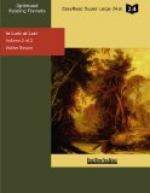It now remained to be seen if he was vindictive.
As for the pupil, when he recovered a little from the blow of this announcement, he saw before him a girl, quite young, dressed in a simple gray or drab colored stuff, which I have reason to believe is called Carmelite. The dress had a crimson kerchief arranged in folds over the front, and a lace collar, and at first sight it made the beholder feel that, considered merely as a setting of face and figure, it was remarkably effective. Surely this is the true end and aim of all feminine adornment, apart from the elementary object of keeping one warm.
“I—I did not know,” the young man said, after a pause, “I did not know at all that I was corresponding with a lady.”
Here she raised her eyes again, and he observed that the eyes were very large and full of light—“eyes like the fishpools of Heshbon”—dove’s eyes.
“I am very sorry,” she said meekly. “It was my fault.”
He observed other things now, having regained the use of his senses. Thus he saw that she wore her hair, which was of a wonderful chestnut brown color, parted at the side like a boy’s, and that she had not committed the horrible enormity of cutting it short. He observed, too, that while her lips were quivering and her cheek was blushing, her look was steadfast. Are dove’s eyes, he asked himself, always steadfast?
“I ought to have told you long ago, when you began to write about—about yourself and other things, when I understood that you thought I was a man—oh, long ago I ought to have told you the truth!”
“It is wonderful!” said the young man, “it is truly wonderful!” He was thinking of the letters—long letters, full of sympathy, and a curious unworldly wisdom, which she had sent him in reply to his own, and he was comparing them with her youthful face, as one involuntarily compares a poet’s appearance with his poetry—generally a disappointing thing to do, and always a foolish thing.
“I am very sorry,” she repeated.
“Have you many pupils, like myself?”
“I have several pupils in mathematics. It does not matter to them whether they are taught by a man or a woman. In heraldry I had only one—you.”
He looked round the room. One end was occupied by shelves, filled with books; in one of the windows was a table, covered with papers and adorned with a type-writer, by means of which Iris carried on her correspondence. For a moment the unworthy thought crossed his mind that he had been, perhaps, artfully lured on by a siren for his destruction. Only for a moment, however, because she raised her face and met his gaze again, with eyes so frank and innocent, that he could not doubt them. Besides, there was the clear outline of her face, so truthful and so honest. The young man was an artist, and therefore believed in outline. Could any sane and intelligent creature doubt those curves of cheek and chin?




